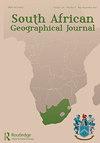Extreme Temperature Events (ETEs) in South Africa: a review
IF 1.4
4区 社会学
Q3 GEOGRAPHY
引用次数: 8
Abstract
ABSTRACT Extreme Temperature Events (ETEs), including heatwaves, warm spells, cold waves and cold spells, have disastrous impacts on human health and ecosystems. The frequency, intensity, and duration of ETEs is projected to increase due to climate change. However, very little research has been done on ETEs in South Africa, and only a few attempts have been made to identify and examine trends. Currently, ten known publications have examined ETEs across South Africa, the majority of which use the South African Weather Service (SAWS) climate database as the primary source. The general findings indicate that the incidence and duration of extreme warm temperatures are increasing, while cold extremes are decreasing. However, inconstancies exist in the indices used to identify ETEs, selection of meteorological stations, study period, and statistical methods used to examine trends. We review the methodological approaches to define ETEs, the extreme temperature indices adopted, the selection of meteorological stations, study periods, data quality and homogeneity, statistical trend analysis, and results. From these, we propose an approximate number of stations to adequately portray temperature variability on a national and regional level. Finally, we reflect on projections of ETEs under current climate change conditions, and the implications of cold and warm ETEs in a South African context.南非极端温度事件(ETEs):综述
极端温度事件(ETEs)包括热浪、暖期、寒潮和冷期,对人类健康和生态系统造成灾难性影响。由于气候变化,预估ete的频率、强度和持续时间将增加。然而,对南非的电子生殖疾病进行的研究非常少,而且只有几次尝试确定和审查趋势。目前,有10份已知的出版物研究了南非各地的etp,其中大多数使用南非气象局(SAWS)气候数据库作为主要来源。总体结果表明,极端温暖气温的发生率和持续时间正在增加,而极端寒冷气温正在减少。然而,用于确定气候变化指数的指标、气象站的选择、研究期间以及用于检验趋势的统计方法都存在不变化。本文综述了极端温度的定义方法、极端温度指标、气象站选择、研究周期、数据质量和均匀性、统计趋势分析和结果。据此,我们提出了大致数量的站点,以充分描绘国家和区域水平上的温度变化。最后,我们反思了在当前气候变化条件下的etp预测,以及在南非背景下冷暖etp的影响。
本文章由计算机程序翻译,如有差异,请以英文原文为准。
求助全文
约1分钟内获得全文
求助全文
来源期刊

South African Geographical Journal
GEOGRAPHY-
CiteScore
3.40
自引率
7.10%
发文量
25
期刊介绍:
The South African Geographical Journal was founded in 1917 and is the flagship journal of the Society of South African Geographers. The journal aims at using southern Africa as a region from, and through, which to communicate geographic knowledge and to engage with issues and themes relevant to the discipline. The journal is a forum for papers of a high academic quality and welcomes papers dealing with philosophical and methodological issues and topics of an international scope that are significant for the region and the African continent, including: Climate change Environmental studies Development Governance and policy Physical and urban Geography Human Geography Sustainability Tourism GIS and remote sensing
 求助内容:
求助内容: 应助结果提醒方式:
应助结果提醒方式:


